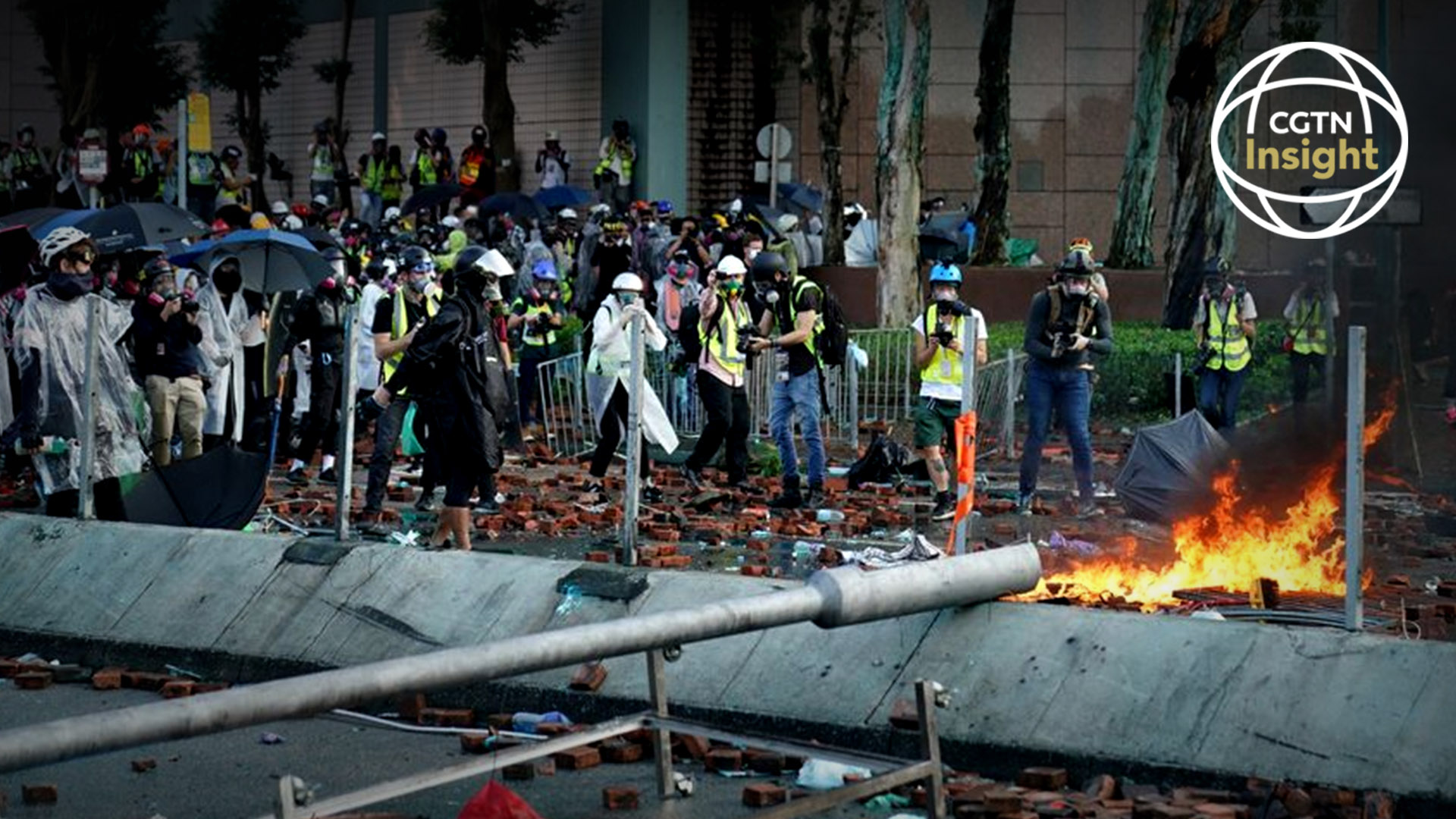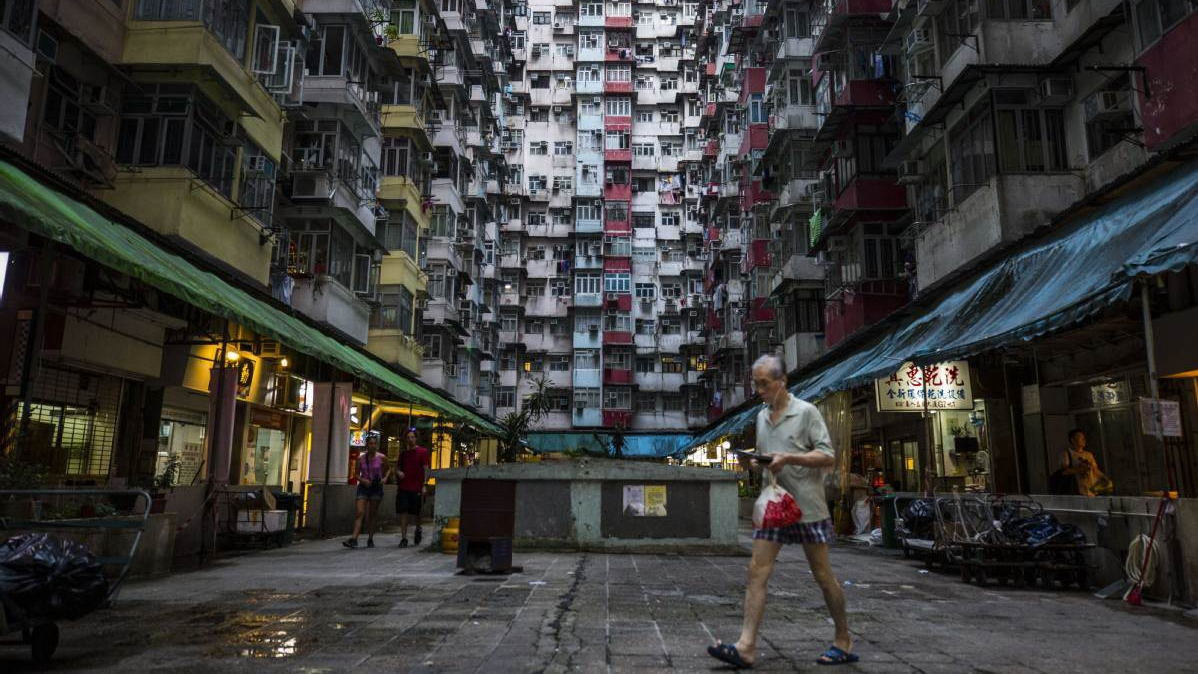
Rioters in standoff with police outside the Hong Kong Polytechnic University in Hong Kong, China, November 17, 2019. /Xinhua Photo
Rioters in standoff with police outside the Hong Kong Polytechnic University in Hong Kong, China, November 17, 2019. /Xinhua Photo
When Western critics tout the idea that the national security legislation for Hong Kong means the end of freedom in the city, they are partly correct.
The legislation restricts the freedom of a small group of people
The introduction of the law, aimed at "preventing, suppressing and imposing punishment for the offences of secession, subversion, organization and perpetration of terrorist activities, and collusion with a foreign country or with external elements to endanger national security in relation to the Hong Kong Special Administrative Region," means the end of the right of riot agitators and those committed to arbitrarily disrupting social stability.
In addition, it signifies the end of the freedom of external forces to support subversive activities in the city. Both "freedoms" have left Hong Kong with deep scars over the past few years, especially since the riots erupted about a year ago.
In contrast, for an overwhelming majority of Hong Kong residents, the enactment of the legislation means the return of their freedom to continue with their study, work and daily life without interruption. Only by restricting the freedom of a small number of people igniting disorder in the city can residents be guaranteed the most rudimentary right to life, security and development.
The law will help promote the concept of nation among the public
Due to historical reasons, the idea of Hong Kong "belonging to a nation" is relatively vague among many Hong Kong residents. When speaking of the "One Country, Two Systems" principle, they tend to focus on "two systems" while ignoring "one country", its pre-condition, even 23 years after the city's return to China.
For the first time, the new law will require the city to "promote national security education in schools and universities and through social organizations, the media, the internet and other means to raise the awareness of Hong Kong residents of national security and of the obligation to abide by the law." It is expected to help correct the idea that Hong Kong is a "stateless nation," an idea that will bring almost no benefit when finding a proper position in a rapidly changing era.

Rioters outside the Hong Kong Polytechnic University (PolyU) in the Hong Kong, China, November 16, 2019. /Reuters
Rioters outside the Hong Kong Polytechnic University (PolyU) in the Hong Kong, China, November 16, 2019. /Reuters
The law is not omnipotent
However important the national security law is in reshaping a stable social environment for Hong Kong, it provides no more than a basic premise for the city's future development. Whether Hong Kong can reverse the trend of being stuck in economic stagnation or even recession and remain relevant in regional or global development, to a large extent, depends on how swift it can be and how much momentum or courage it has in carrying out social and economic reforms to adapt itself to the changing world.
The problems that have hindered Hong Kong's development cannot be solved in one fell swoop. Here are some major aspects for the city to focus upon in the new national-security-law era so that the window of opportunity won't be missed again in the coming decades:
More smooth integration with the Chinese mainland growth plans
Economically, Hong Kong may be affected in the short term as the United States, its second largest trading partner, eliminated the city's special customs status. According to Nicholas Lardy, an expert on the Chinese economy from the Peterson Institute for International Economics, only one percent of the 45 billion U.S. dollars of goods exported to the States from Hong Kong is actually produced in the city and is eligible for low tariff rates. It means that the impact of Washington's move on the city is limited.
More importantly, Hong Kong needs to cast its gaze northward on the Chinese mainland as the latter has proven its vitality and resilience time and time again, even when the region or the whole world was entangled in such mires as the 1997 Asian financial crisis, the 2008 subprime crisis and the ongoing coronavirus pandemic.
In its latest World Economic Outlook Update issued a week ago, the International Monetary Fund (IMF) predicted that the Chinese mainland's economy will grow by one percent this year—better than other major economies, such as the United States and the European Union, which are projected to shrink by eight percent and over ten percent, respectively.
The IMF also predicts that the economic growth of the Chinese mainland will surpass eight percent in 2021, the highest growth of any country. The Financial Times reported on Sunday that the Chinese mainland has leapfrogged Britain and France to become the world's fifth-largest fund hub. The sharp-nosed fund managers won't make a move for nothing.
Only through actively integrating its growth strategy into the regional development plans the central government has come up with, such as the Greater Bay Area Plan and the Belt and Road Initiative, can the city realize a more steady and efficient growth aboard the mother ship.

An old man heads home from grocery shopping in Quarry Bay, Hong Kong, China, September 18, 2019. /Xinhua Photo
An old man heads home from grocery shopping in Quarry Bay, Hong Kong, China, September 18, 2019. /Xinhua Photo
Be more decisive in carrying out economic restructuring
Hong Kong has experienced a major transformation from a regional manufacturing and trade hub of toys, cheap clothing and plastic goods to a global financial center over the past few decades. However, when the property and financial services sectors become the pillar of an economy after industrial hollow-out, it would be relatively hard for the government to push for economic reforms as stakeholders tend to stay in their comfort zone of making easy and high profits, especially when new projects are cash-burning and unable to generate imminent profit. It would increase the city's exposure to the risk of financial crises, especially when the housing bubble bursts.
The Hong Kong government did realize the problem and tried to carry out plans to diversify the economy and strengthen such sectors as environmental protection and the creative, cultural and high-tech industries, especially after the 1997 and 2008 financial crises. But as Dr. Thomas Man Hung Chan, former head of the China Business Center of Hong Kong Polytechnic University, pointed out, the non-intervention attitude adopted by the local government hasn't been helpful in driving the transformation.
Therefore, among the slew of issues to be addressed, a more decisive government with stronger leadership is among the most urgently needed. The world's leading financial center, New York, is a good example for reference. It overtook Silicon Valley as America's top tech hub on the Saville Tech Cities Index last year.
Take concrete measures to solve livelihood issues, esp. housing
Among all the issues regarding Hong Kong livelihoods, housing is a primary concern, which has been recognized by all the chief executives since its return to China. Each chief executive has made plans to increase the housing supply to help residents gain access to adequate and affordable housing. But the efforts mostly turned out to be fruitless as they were frequently blocked by people with vested interests, such as big property providers, for whom the decline of real-estate prices was the least desirable outcome.
In January, Chief Executive Carrie Lam announced a package of ten livelihood initiatives set to benefit over a million grassroots and underprivileged people. Regarding the housing problem, she said, "Although the Government has been taking multi-pronged short-, medium- and long-term measures to expand land resources to increase the housing supply, as well as implementing a number of new initiatives to address aspirations for homeownership, it takes time to increase the housing supply."
To counteract possible delays or any other unexpected interruption to the plan, further assistance, including cash allowance for low-income households not living in public housing and a further increase of transitional housing, is also on offer. Such initiatives will help to enhance social cohesion, an important construct greatly needed in Hong Kong right now, if they can be concretely implemented.
So long as Hong Kong solidly takes the initiative and presses ahead with its transformation plans, the central government and people on the Chinese mainland will always be there offering support for its revitalization.
(If you want to contribute and have specific expertise, please contact us at opinions@cgtn.com.)